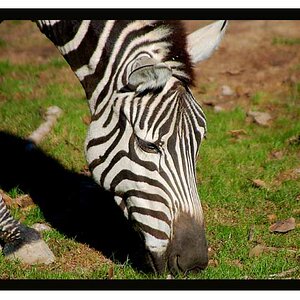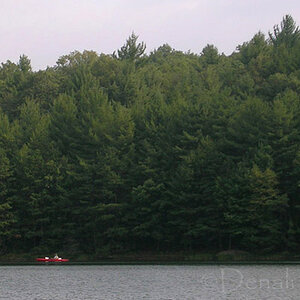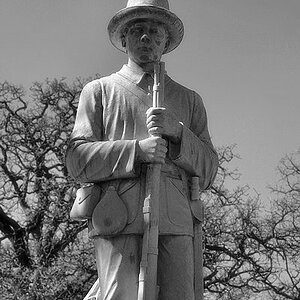RonPrice
TPF Noob!
- Joined
- Mar 21, 2010
- Messages
- 13
- Reaction score
- 1
- Location
- George Town Tasmania Australia
- Website
- www.ronpriceepoch.com
- Can others edit my Photos
- Photos NOT OK to edit
Section 1:
To part with my photographs would be, in part, to forget. Photographs are a mnemonic archive that enables us to negotiate our displacement from the past and our placement in the future. They are nostalgic items coloured with pensiveness, each with a point that pierces our vision. Viewers' memory traces are developed through photographs; their sentimental yearning for an irrecoverable past is indulged. There is recuperative power in this process of temporal and spacial transference.[1]
The vicissitudes of life seem to be reduced if not eliminated as we gaze at the photographs. Life's brevity seems to be partly an illusion. We achieve an immortality here, an at-oneness with all time, an annihilation of the years.[2] Walter Benjamin(1892-1940) that German literary critic, philosopher, social critic, translator, radio broadcaster and essayist who combined elements of German idealism or Romanticism, historical materialism and Jewish mysticism, made enduring and influential contributions to aesthetic theory and Western Marxism, and is associated with the Frankfurt School. He had, for me at least, illuminating things to say about photography.
Section 2:
Benjamin expressed the idea that the person who views a photograph "feels an irresistable urge to search the picture for the tiny spark of contingency, of the here and now, with which reality has seared the subject." [3] And so I do. But readers of my autobiography will be spared that exercise. Even though many of the photos in my now extensive collection are outside my experience, I still may be seized by these images of the past or some details within them, the ephemeral cultural detritus that photography illuminates so effortlessly. Even though they are beyond the reach of my intellect in some ways they open-up new spaces, quasi-memories.
"It is not the person who steps out," writes David Frisby, "but what can be stripped away from him."[4] Instead of being an aid to memory and knowledge photos often function to encourage the opposite tendency. Photos, writes Frisby, gobble up our world. They snatch our world from death; total 'presentness' is established and history is absent inspite of the sense of reality conveyed by the photograph. It is a reality we can no longer touch. We experience nostalgia, the inevitability of separation, mystery and, sometimes, bitterness. We experience a feeling of magic. Sometimes narcissism is fostered, Baudelaire once wrote.[5]
Section 3:
However critical one is of photographs, the family portrait and the photo album assume a significant place in people's homes. Although the photo may give an undue emphasis to the outer world, they can also become part of a balanced inner and outer experience. "The best part of beauty," wrote Francis Bacon, "is that which no picture can express."(6) Francis Bacon(1909-1992) was an Irish-born British figurative painter known for his bold, graphic and emotionally raw imagery. Photos are suggestive and, if they do not suggest much more than is in the photos, they have little use or power. Diane Arbus puts the idea in a clever way: "A photograph is a secret about a secret. The more it tells you the less you know."
Photos are enticements to reverie, wrote Susan Sontag. They are like a wood-fire in a room. They have a surface heat but there is something beyond them, something we intuit, some inexhaustible invitation to deduction, speculation and fantasy. "The very muteness of what is, hypothetically, comprehensible in photographs," writes Sontag, "is what constitutes their attraction and provocativeness."[7] Several years ago, just after retiring from my professional work as a teacher, after 50 years in classrooms(1949-1999),I organized some of my photos into the context of my Journal. I wrote an introduction to my collection of photographs. I have not placed it here since the above post is long enough, probably too long for many readers at this site. "Such is life," as that famous or infamous Australian outlaw Ned Kelly is reported to have said on his way to the gallows in NSW in 1880.-Ron Price, Australia
--------------------------FOOTNOTES-----------------------------------------------------------------------------------------------
[1] Ron Price, A summary of the words of an Iranian in Los Angeles and his views of old photographs, 12 December 1998.
[2] Richard N. Coe, "Truth, Memory and Artifice," When the Grass Was Taller: Autobiography and the Experience of Childhood, Yale UP, London, 1984.
[3] Walter Benjamin, "A Small History of Photography," One-Way Street and Other Writings, trans. Edmund Jephcott and Kingsley Shorter, London, NLB, 1979, p.243,
[4] David Frisby, Fragments of Modernity: Theories of Modernity in the Work of Simmel, Kracauer and Benjamin, Polity Press, 1985, p.155.
[5] Baudelaire in Donald Kuspit, The New Subjectivism: Art in the 1980s, Da Capo Press, NY, 1983, p.404.
[6] Quotations n photography, Internet, January 2003.
[7] Susan Sontag, op.cit.
To part with my photographs would be, in part, to forget. Photographs are a mnemonic archive that enables us to negotiate our displacement from the past and our placement in the future. They are nostalgic items coloured with pensiveness, each with a point that pierces our vision. Viewers' memory traces are developed through photographs; their sentimental yearning for an irrecoverable past is indulged. There is recuperative power in this process of temporal and spacial transference.[1]
The vicissitudes of life seem to be reduced if not eliminated as we gaze at the photographs. Life's brevity seems to be partly an illusion. We achieve an immortality here, an at-oneness with all time, an annihilation of the years.[2] Walter Benjamin(1892-1940) that German literary critic, philosopher, social critic, translator, radio broadcaster and essayist who combined elements of German idealism or Romanticism, historical materialism and Jewish mysticism, made enduring and influential contributions to aesthetic theory and Western Marxism, and is associated with the Frankfurt School. He had, for me at least, illuminating things to say about photography.
Section 2:
Benjamin expressed the idea that the person who views a photograph "feels an irresistable urge to search the picture for the tiny spark of contingency, of the here and now, with which reality has seared the subject." [3] And so I do. But readers of my autobiography will be spared that exercise. Even though many of the photos in my now extensive collection are outside my experience, I still may be seized by these images of the past or some details within them, the ephemeral cultural detritus that photography illuminates so effortlessly. Even though they are beyond the reach of my intellect in some ways they open-up new spaces, quasi-memories.
"It is not the person who steps out," writes David Frisby, "but what can be stripped away from him."[4] Instead of being an aid to memory and knowledge photos often function to encourage the opposite tendency. Photos, writes Frisby, gobble up our world. They snatch our world from death; total 'presentness' is established and history is absent inspite of the sense of reality conveyed by the photograph. It is a reality we can no longer touch. We experience nostalgia, the inevitability of separation, mystery and, sometimes, bitterness. We experience a feeling of magic. Sometimes narcissism is fostered, Baudelaire once wrote.[5]
Section 3:
However critical one is of photographs, the family portrait and the photo album assume a significant place in people's homes. Although the photo may give an undue emphasis to the outer world, they can also become part of a balanced inner and outer experience. "The best part of beauty," wrote Francis Bacon, "is that which no picture can express."(6) Francis Bacon(1909-1992) was an Irish-born British figurative painter known for his bold, graphic and emotionally raw imagery. Photos are suggestive and, if they do not suggest much more than is in the photos, they have little use or power. Diane Arbus puts the idea in a clever way: "A photograph is a secret about a secret. The more it tells you the less you know."
Photos are enticements to reverie, wrote Susan Sontag. They are like a wood-fire in a room. They have a surface heat but there is something beyond them, something we intuit, some inexhaustible invitation to deduction, speculation and fantasy. "The very muteness of what is, hypothetically, comprehensible in photographs," writes Sontag, "is what constitutes their attraction and provocativeness."[7] Several years ago, just after retiring from my professional work as a teacher, after 50 years in classrooms(1949-1999),I organized some of my photos into the context of my Journal. I wrote an introduction to my collection of photographs. I have not placed it here since the above post is long enough, probably too long for many readers at this site. "Such is life," as that famous or infamous Australian outlaw Ned Kelly is reported to have said on his way to the gallows in NSW in 1880.-Ron Price, Australia
--------------------------FOOTNOTES-----------------------------------------------------------------------------------------------
[1] Ron Price, A summary of the words of an Iranian in Los Angeles and his views of old photographs, 12 December 1998.
[2] Richard N. Coe, "Truth, Memory and Artifice," When the Grass Was Taller: Autobiography and the Experience of Childhood, Yale UP, London, 1984.
[3] Walter Benjamin, "A Small History of Photography," One-Way Street and Other Writings, trans. Edmund Jephcott and Kingsley Shorter, London, NLB, 1979, p.243,
[4] David Frisby, Fragments of Modernity: Theories of Modernity in the Work of Simmel, Kracauer and Benjamin, Polity Press, 1985, p.155.
[5] Baudelaire in Donald Kuspit, The New Subjectivism: Art in the 1980s, Da Capo Press, NY, 1983, p.404.
[6] Quotations n photography, Internet, January 2003.
[7] Susan Sontag, op.cit.
Last edited:










![[No title]](/data/xfmg/thumbnail/42/42057-1509913128bb1db2bc11235c05832fd4.jpg?1619739993)


